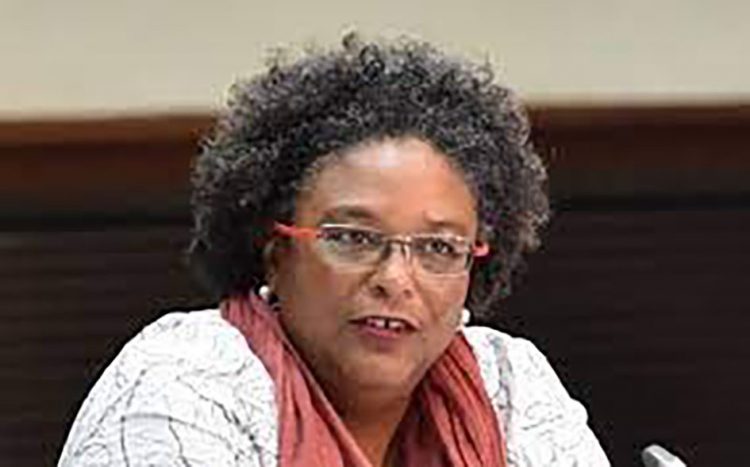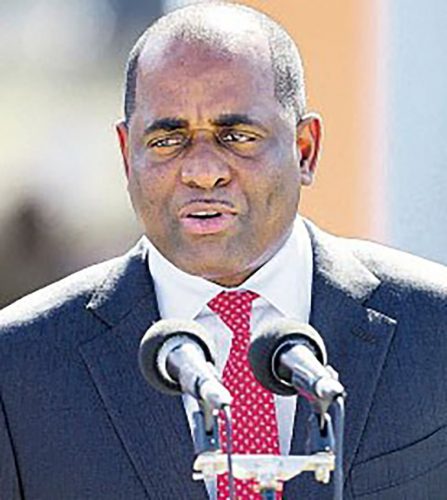Determined to meet the March 31st deadline for the free movement of nationals within the bloc, Caricom’s Legal Affairs Committee last week met and signed off on the draft document so that Heads can finalise it when they meet again this week.
“… The heads of government will meet on the 15th of March with the hope that we can sign off in time for the deadline given in Trinidad of the 31st of March, for the full free movement of people,” Barbados Prime Minister and Head of the Reconstituted Intergovernmental Task Force (ITGF) Mia Mottley said when the 46th Heads of Government Conference closed in Guyana two weeks ago.
“People have the right to move now for six months without question. What we are talking about is removing that six months’ constraint, but we equally have to understand that there are the minimum rights that are guaranteed to our citizens when they move from one country to another,” she added.

Mottley, this newspaper understands, was in the Dominican Republic for IDB meetings, which ended yesterday, and was represented at the meeting on free movement by Barbados Ambassador to Caricom David Commissong.
There has been no word on the outcome of last week’s meeting but this newspaper understands that plans and the schedules remain the same.

Last year, Caricom marked the 50th anniversary of the signing of the original Treaty of Chaguaramas with festivities across the region and resolved to remove impediments to free movement by March of this year.
The last chair of Caricom, Roosevelt Skerrit had made the announcement, even as he acknowledged that the decision could not be implemented immediately, as modalities in the Revised Treaty of Chaguaramas will have to be dealt with by a legal team.
“We have taken a decision to have the free movement of all categories of people to live and work… We believe that this is a fundamental part of the integration architecture and at 50 (years), we could not leave Trinidad and Tobago and not speak about the core of the integration movement and that is people’s ability to move freely within the Caribbean Community,” Skerrit had said at the 45th Meeting of Heads ended last year in Trinidad and Tobago.
The Dominican Prime Minister explained that this decision will allow people to access primary and equal health care and educational opportunities. The lifting of restrictions will also pave the way for better security and hassle-free travel.
Skerrit added further that with this decision, they have served the community and given the people of the region what they need. “We hope to have it implemented by the 30th of March 2024. This is great news and I think of the discussion and the number of decisions we have taken this is ‘de decision’ we have taken at this conference. I believe our founding fathers are smiling down from heaven because we have arrived at this decision,” he had stated to applause from those present.
In her end of year message last year, Caricom Secretary General Dr Carla Barnett said that 2023 was a landmark year for the Caribbean Community, pointing out that free movement of all Caricom nationals as mandated by the Heads of Government, wass expected to be in place by the end of this month.
Plans for this year, Barnett said, would see the Caricom Secretariat continuing diligently to administer the community’s priorities of deepening economic integration and trade, strengthening foreign policy coordination and community relations and human and social development, sustainable development, and regional security.
In particular, the secretariat will focus its efforts to implement the free movement of all Caricom nationals within the community by March 2024 as determined by Heads of Government. “I extend sincere thanks to Heads of Government of the Caribbean Community, their ministers and senior officials, for their commitment to regional integration and the implementation of programmes and policies to improve the lives of the people of the region. Special thanks also to our international partners, the private sector, labour organisations, and to the civil society groups which have responded so positively to the secretariat’s efforts towards more structured engagement,” Barnett stated.
The end-of-conference communiqué stated that it had received a report on the work of the Reconstituted Intergovernmental Task Force (ITGF) to implement the decision of the conference of July 2023 to work towards free movement of all community nationals.
“They agreed that draft amendments to the Revised Treaty of Chaguaramas should include basic guarantees to be afforded to all Caricom nationals exercising the right of free movement and directed the IGTF and Legal Affairs Committee to complete their work for the consideration of a meeting of the conference to take place on 15 March,” the document stated.
CSME
As it relates to the Caricom Single Market and Economy (CSME), the communiqué said that an update was also received from Mottley, who chairs the Prime Ministerial Sub-Committee (PMSC) on the CSME, on progress regarding its implementation.
“The conference noted the report of the PMSC-CSME on the status of important CSME objectives and agreed on urgent steps to expedite several of them. These include intensified work towards free movement, speeding up reviews to facilitate harmonisation of certain business laws and mutual recognition,” the document said.
“They stressed the importance of digital transformation with respect to companies’ registries and agreed to establish a regional committee of information technology experts to help with this digital transformation, under the leadership of Prime Minister Dickon Mitchell as Lead Head responsible for ICT and incoming chair,” it added while noting the work underway to complete initiatives such as the establishment of a Regional Securities Market by July 2024.
Mottley had told the press conference that the Heads had come to the decision that they “would work to get the mutual recognition of companies across the community settled, and we are working to get that done by our meeting in July in Grenada.’
“To allow people the right to move, and then tell them they have to pay separate sums to form companies, where it is the same company doing the same business, in each of the countries that they are going in, is a burden too heavy for you to carry in a single market and single economy,” she added.
It is why she said that they recognised that more will have to be done, hence Caricom Heads have to plan to meet with the Organisation for Economic Cooperation and Development (OECD) to discuss corporate registries and where it is, in terms of integrating with the global financial sector, with respect “to ensuring that there will be no negative listing to any of the member states… we recognise that key to this is having a common digital platform.”
Spearheaded by Prime Minister Mitchell, the platform will allow those going “to register in one country [to] immediately see what is available in terms of conflict or capacity to register,” Mottley added. However, she said, heads have decided that they also will need to have an expert group of ICT persons to advise on the most appropriate technology to use.
Meanwhile, Mottley explained that a commitment was made to get the Regional Capital Markets off the ground. “This is absolutely critical because we have a stock exchange in Jamaica that has done very well. We have a stock exchange in Barbados that has not done so well. We have one in Trinidad that is there as well. The reality is, if we are going to facilitate the movement of capital, we need a regional capital initiative market that makes it [easy] for capital to find its most natural [place] to reside and get the best investments possible,” she said.






